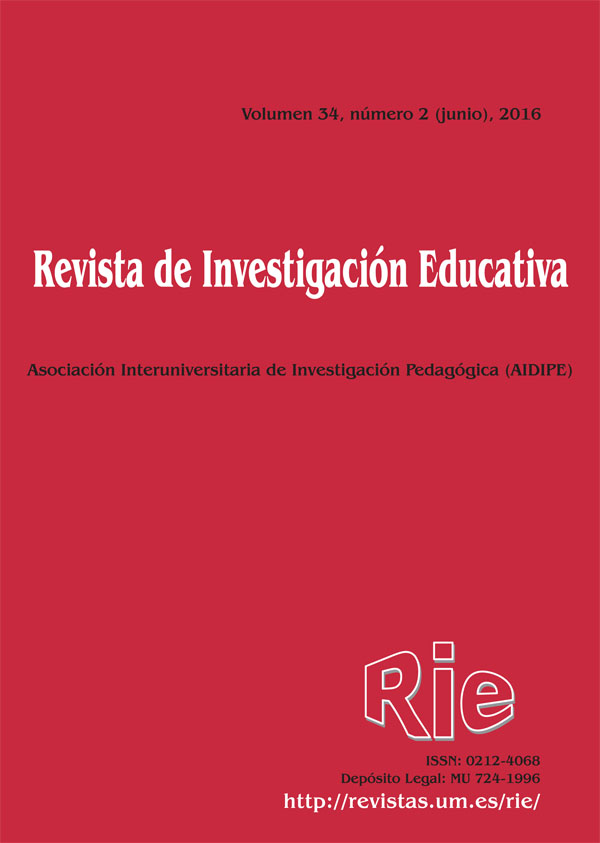The structuration of the scientific essay about intercultural contents and writing competences with university students
Supporting Agencies
- Universidad de Granada y Junta de Andalucía
Abstract
Organizing a text, in an argumentative form, is a first-order demand in university tasks because: a) it helps students to synthesize ideas and deepen the understanding and expression of their own knowledge in any area, and b) it contributes decisively to the construction of the cultural identity, from a critical perspective. A multimethod methodology is applied in this research, specifically: a) content analysis using NVivo software to describe grammatical structures and writing competences; and b) statistical analysis using SPSS program to find the
correlation between writing competences and the expressed structural elements. It concludes with the training needs of students for the development of the argumentative composition, and a didactic proposal that fosters intercultural written communicative competences.
Downloads
-
Abstract2842
-
PDF (Español (España))1750
References
Arroyo, R. (2009). Desarrollo Metacognitivo y Sociocultural de la Composición Escrita. Interculturalidad y Tecnologías en la enseñanza de la escritura multilingüe. Granada: Nativola.
Arroyo, R. (2013). Descripción de procesos en la composición escrita de estudiantes universitarios para un desarrollo multilingüe y tecnológico. Revista de Investigación Educativa, 31(1), 167-184.
Arroyo, R. & Gutiérrez-Braojos, C. (2013). Validación de una entrevista metasociocog- nitiva y un sistema de categorías, para la investigación multilingüe de procesos escritores. Educación y Diversidad. Revista Interuniversitaria de Investigación en Discapacidad e Interculturalidad, 7(2), 67-86.
Bazerman, C. (Ed.). (2008). Handbook of research on writing. Mahwah, NJ: Erlbaum.
Beaufort, A. & Iñesta, A. (2014). Author profiles: Awareness, competence, and skills. En E. M. Jakobs & D. Perrin. (Eds.), Handbook of Writing and Text Production (pp. 141-158). Berlín/Boston: Walter de Gruyter.
Cernadas, F., Santos, M. & Lorenzo, M. (2013). Los profesores ante la educación intercultural: el desafío de la formación sobre el terreno. Revista de Investigación Educativa, 31(2), 555-570.
Cleaveland, M. C. & Larkins, E. R. (2004). Web-based practice and feeback improve tax students´ written communication skills. Journal of Accounting Education, 22, 211-228. http://doi:101016/j.jaccedu.2004.08.001
De La Paz, S. & McCutchen, D. (2010). Learning to Write. In R. E. Mayer & P. A. Alexander (Eds). Handbook of Research on Learnig and Instruction, 32-54. Routledge. New York.
Dysthe, O. (2007). How a Reform Affects Writing in Higher Education. Studies in Higher Education, 32(2), 237-252.
Kieft, M., Rijlaarsdam, G. & Van Den Bergh, H. (2006). Writing as a learning tool: Testing the role of students’ writing strategies. European Journal of Psychology of Education, 21(1), 17-34.
Gavin, B. & Marshall, J. (2012). The impact of training students how to write intro- ductions for academic essays: an exploratory, longitudinal study. Assessment & Evaluation in Higher Education, 37(6), 653-670. http://doi:10.1080/02602938.2011.563277
Graham, S., & Harris, K. R. (2005). Writing better: Teaching writing processes and self- regulation to students with learning problems. Baltimore: Brookes.
Greasley, P. & Cassidy, A. (2010). When it comes round to making assignments: How to impress and how to `distress´ lecturers. Assessment & Evaluation in Higer Education, 35(2), 173-89.
Mayorga, M.J. & Ruiz Baeza, V.M. (2002). Muestreos utilizados en la investigación educativa en España. Revista Electrónica de Investigación y Evaluación Educativa, 8(2), 1-8.
Myhill, D. & Fisher, R. (2010). Writing development: cognitive, sociocultural, linguistc perspectives. Journal of Research in Reading, 33(1), 1-3.
Nussbaum, E.M. & Kardash, C. M. (2005). The effects of goal instructions and text on the generation of counterarguments during writing. Journal of Educational Psychology, 97(2), 157-16.
Salvador, F. (2005). Procesos cognitivos en la expresión escrita: Modelos teóricos e investigación empírica. En F. Salvador, (Ed.), La expresión escrita de alumnos con necesidades educativas especiales. Procesos cognitivos (pp. 15-44). Archidona: Aljibe.
Salvador, F. (2008). Competencia escritora del alumno universitario: El texto argumentativo (ensayo). V Congreso Iberoamericano de Docencia Universitaria AIDUe ICE, Valencia (pp. 907-910). Valencia.
Sydney, R. (2014). Academic essay writing as imitative problem solving: examples from distance learning. Assessment & Evaluation in Higher Education, 39(3), 263-274. http://doi:10.1080/02602938.2013.822846
Takao, A. Y. & Kelly, G.J. (2003). Assessment of Evidence in University Students´ Scientific Writing. Science & Education, 12, 341-363.
Tashakkori, A. & Teddlie, C. (2003). Handbook of mixed methods in social and behavioral research. Thousand Oaks, CA: Sage.
Venables, A. & Summit, R. (2003). Enhancing Scientific Essay Writing Using Peer Assessment. Innovations in EducationandTeachingInternational, 40(3), 281-290.
Walker, G. E., Golde, C. M., Jones, L., Bueschel, A.C., & Huntchings, P. (2008). The formation of scholars: Rethinking doctoral education for the twenty-first century. San Francisco, CA: Jossy-Bass.
The articles and scientific documents published in RIE abide the following conditions:
1. The Servicio de Publicaciones de la Universidad de Murcia (the publisher) has the property rights (copyright) of all the documents published and allows the reuse under the user’s license indicated in point 2.
2. All documents are published in the digital edition of RIE under a Creative Commons Reconocimiento-NoComercial-SinObraDerivada 4.0 Internacional. (legal document) license. These documents can be copied, used, distributed, communicated and explained publicly if: i) the author(s) and its original source of publishing (magazine, publisher and URL of the document) are cited; ii) it is not used for commercial purpose; iii) the existence and the specifications about this license are mentioned.
3. Auto-archive’s conditions. The authors are allowed and encouraged to digitally distribute the pre-print versions (a version before evaluation) and/or post-print (a version that it is already evaluated and accepted to its publication). This promotes circulation and distribution earlier and can increase the citations and significance within the academic community.










